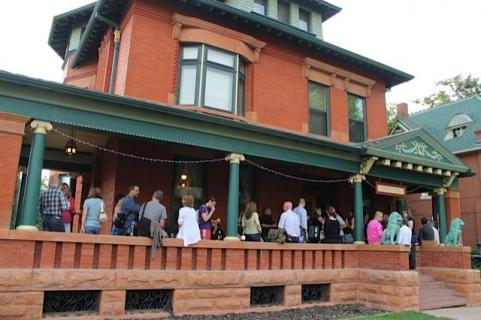
by Maggie Ferguson
A month into Emerson College’s M.F.A. program in fiction, I was missing Lighthouse. It felt like artistic homesickness. To understand why, I began to compare the M.F.A. experience with Lighthouse.
Both academia and nonprofit writing centers share a workshop structure, encourage a lot of reading, and offer community. At both Lighthouse and Emerson, I’ve found that there are several constants that come with being a writer, no matter where I am:
Rejection—If you’ve struggled with job hunting or apartment finding or getting a date or door-to-door sales, just think to yourself, “If I wanted this much rejection, I’d be a writer.”
Discouragement—I’ve personified my discouragement to look like Dobby, the house elf in Harry Potter. He trails me relentlessly. If he had his way, we’d spend all day together, probably on a seesaw, and I’d get nothing done.
[caption id="attachment_7864" align="aligncenter" width="418"] "Dobby loves seesaws, sir."[/caption]
"Dobby loves seesaws, sir."[/caption]
Sportsmanship—In any environment, writing should be enjoyed. Art is so subjective, and writerly sportsmanship means being respectful of others and their arts with proper consideration for fairness and fellowship. I need a better poker face, and if I could go back and be nicer, I would.
But there are differences, too. I’d never realized how much pressure M.F.A. students face. I assumed I wouldn’t get stressed, and I was surprised. It’s the end of the semester now, and I just want to get rid of the tired bruises under my eyes. I’ve found other differences between Lighthouse and Emerson:
Productivity—I am expected to turn in two stories for workshop this semester. In the same amount of time at Lighthouse, I would get critiqued four times. But this is misleading. Even though I am turning in fewer stories, I’m expected to write more. The M.F.A. program frames writing as an immediate need, as important as eating daily.
Publication—M.F.A. instructors push their students to get published more than Lighthouse instructors, but Lighthouse instructors do a better job of valuing each piece as art for art’s sake. The M.F.A. program, more so than Lighthouse, expects to see a specific style of publishable literary fiction.
Competition—To me, the M.F.A. program feels competitive. Lighthouse felt friendlier. I want my writing communities to feel like teams. If you think about how many people want to write, it’s a very competitive sport. I prefer to minimize competition in order to be more true and respectful to art. Too much competition can choke voices before they have a chance to find the words they need.
[caption id="attachment_7871" align="aligncenter" width="320"] A non-Lighthouse lighthouse[/caption]
A non-Lighthouse lighthouse[/caption]
As I drafted and redrafted over the course of my first semester, I was reminded that being a writer (like being a student) fundamentally depends on self-motivation: writing depends on the writer working. It’s a kind of individual entrepreneurship that exists outside of capitalism. A writer invests hours of self-driven practice to hone a skillset that delivers a high-caliber product whose value resists evaluation. Writers subsist off steady diets of writing, reading, and community. I find that as long as I practice writing, I am—artistically speaking—home.
Maggie Ferguson just finished her first semester studying fiction in Emerson College's M.F.A. program. Before leaving Denver for Boston, she habitually attended advanced short story workshops at Lighthouse, tweeted from the Lighthouse Twitter account, and volunteered at nearly every Draft. Her fiction has appeared in Stone Crown’s Magazine and elsewhere.

